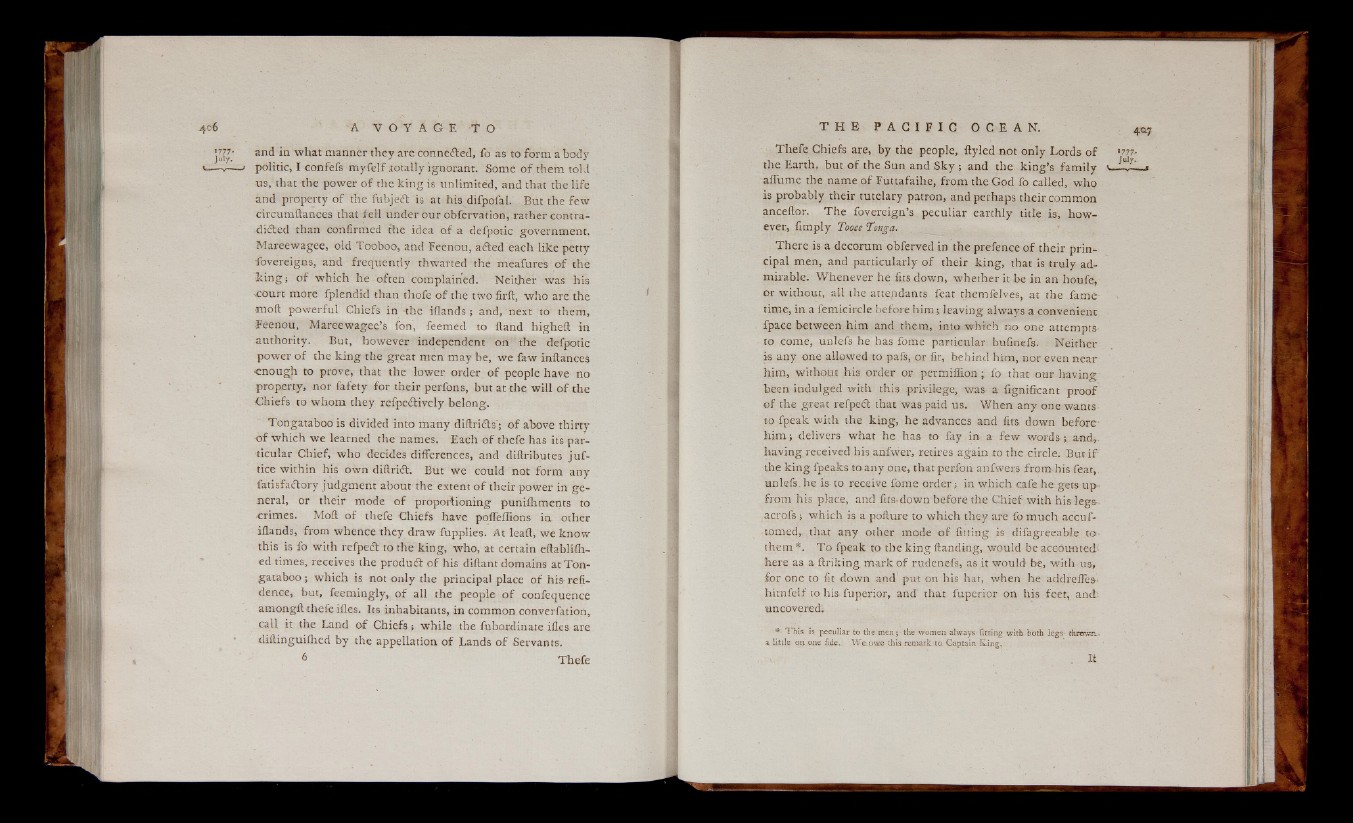
and in what manner they are connected, fo as to form a body
politic, I confefs myfelf totally ignorant. Some of them told
us, that the power of the king is unlimited, and that the life
and property of the fubjeil is at his difpofal. But the few
circumftanees that fell under our obfervation, rather contra-
diiled than confirmed the idea of a defpotic government.
Mareewagee, old Tooboo, and Feenou, ailed each like petty
fovereigns, and frequently thwarted the meafures of the
king; of which he often complained. Neither was his
-court more fplendid than thofe of the ttvo firil, who are the
moil powerful Chiefs in-the iilands ; and, next to them,
Feenou, Mareewagee’s fob, feemed to ftand higheil iu
authority. But, however independent ori the defpotic
power of the king the great men may be, we faw inftances
¡enough to prove, that the lower order of people have no
property, nor fafety for their perfons, but at the will of the
Chiefs to whom they relpeitively belong.
Tongataboo is divided into many diilriils'; o f above thirty
of which we learned the names. Each of thefe has its particular
Chief, who decides differences, and diftributes juf-
tice within his own diftriil. But we could not form any
fatisfaflory judgment about the extent of their power in general,
or their mode of proportioning punilhments to
■crimes. Mod of thefe Chiefs have pofleffions in other
iilands, from whence they draw fupplies. At leaft, we know
this is fo with refpecT to the king, who, at certain eftablifli-
ed times, receives the produil of his diftant domains at Tongataboo
; which is not only the principal place of his-refi-
dence, but, feemingly, of all the people of confequence
amongil thefe illes. Its inhabitants, in common converfation,
call it the Land of Chiefs; while the fubordinate iiles are
diilinguilhed by the appellation of Lands of Servants.
Thefe Chiefs are, by the people, ftyled not only Lords of ■777-
the Earth, but of the Sun and Sky ; and the king’s family
affume the name of Futtafaihe, from the God fo called, who
is probably their tutelary patron, and perhaps their common
anceilor. The fovereign’s peculiar earthly title is, however,
limply Tooee ‘Tonga.
There is a decorum obferved in the prefence of their principal
men, and particularly of their king, that is truly admirable.
Whenever he fits down, whether it be in an houfe,
or without, all the attendants feat themfelves, at the fametime,
in a femicircle before him; leaving always a convenient
fpace between him and them, into which no one attempts
to come, unlefs he has fome particular bufinefs. Neither
is any one allowed to pafs, or fit, behind him, nor even near
him, without his order or permillion ; fo that our having
been indulged with this privilege, was a fignificant proof
of the great refpedl that was paid us. When any one wants
to fpeak with the king, he advances and fits down before
him; delivers what he has to fay in a few words ; and,
having received his anfwer, retires again to the circle. But if-
the king fpeaks to any one, that perfon anfwers from-his fear,
unlefs. he is to receive fome order; in which cafe he gets upfront
his place, and fifs-down before the Chief with his legs,
acrofs ; which is a poilure to which they are fo much accuf-
■ tomed,. that any other mode of fitting is difagreeable to-
them *. To fpeak to the king Handing, would be accounted,
here as a ilriking mark of rudenefs, as it would be, with us,
for one to fit down and1 put on his hat, when he addreilea-
himfelf to his fuperior, and' that fuperior on his feet, and:
uncovered.
* This is peculiar to the men; the women always- fitting with, both legs- thrown.,
a little on one fide.. We. owe this remark.to Captain K in g ..